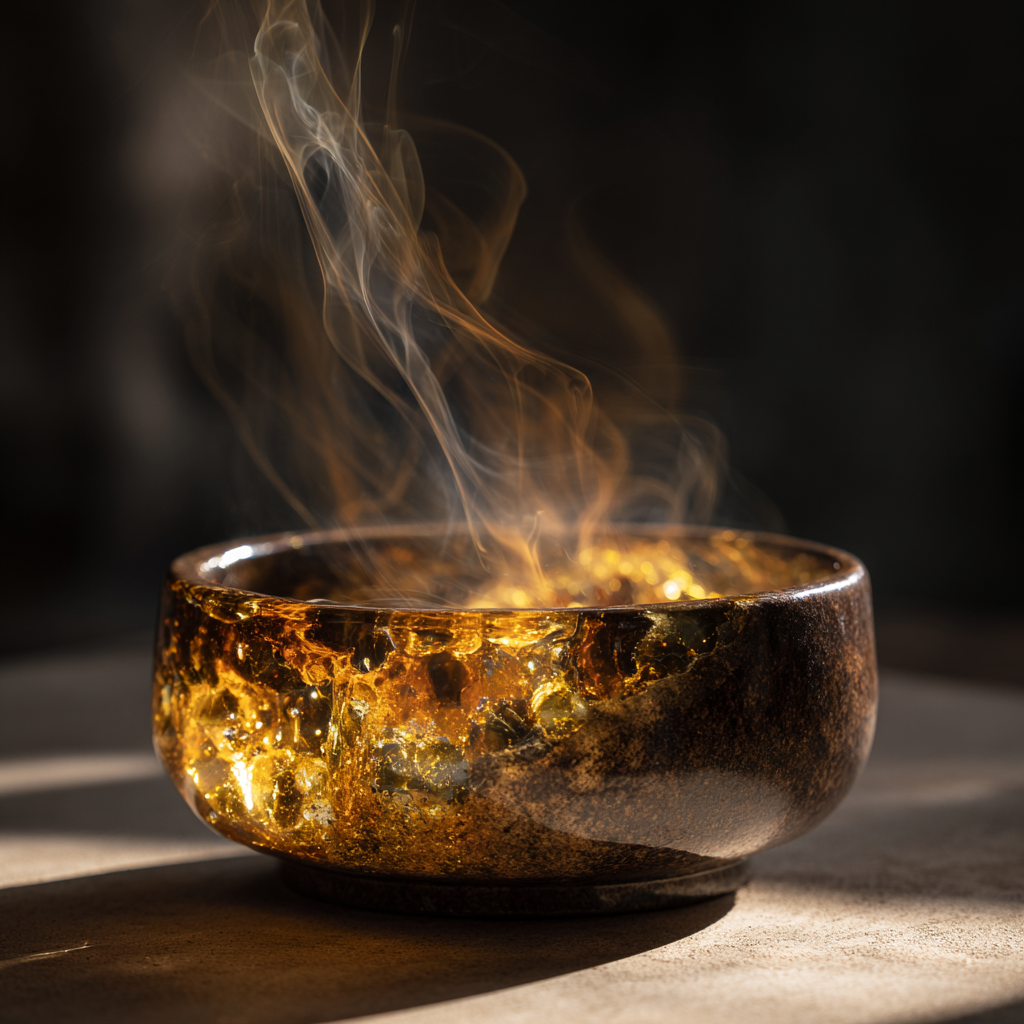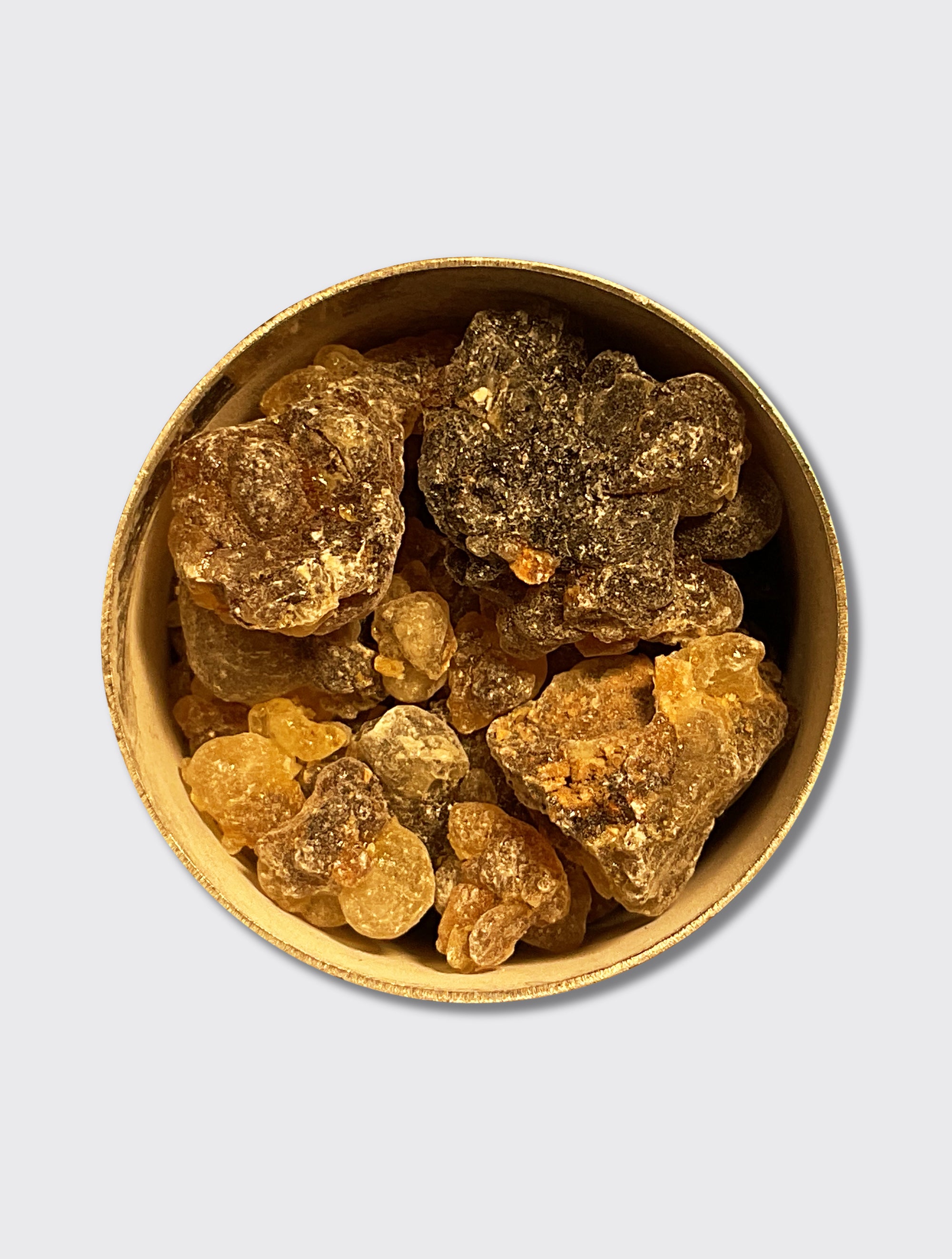The spiritual and cultural significance of frankincense

History of frankincense
Frankincense has ancient origins dating back to the dawn of human civilization. It has played a significant role in many cultures and has evolved over the ages to take on a variety of meanings and uses.
Theuse of frankincense dates back over 6,000 years, with traces of its use in the ancient civilizations of Egypt, Mesopotamia and the Indus Valley. The ancient Egyptians used it in their religious rituals and offered it to the gods as a precious gift. In Mesopotamia, it was considered a symbol of purification and spiritual connection.
Over the ages, frankincense has acquired a variety of meanings and uses. In biblical times, it was mentioned in the Old Testament as a key ingredient in the religious rituals of the Jerusalem temple. Frankincense was seen as a bridge between the material and spiritual worlds.
During the Roman Empire, frankincense was associated with wealth and royalty. It was also used medicinally for its curative properties.
In the Middle Ages, it became a precious commodity in trade along the incense route linking Arabia to Europe. Frankincense was sought after for its fragrant qualities and ritual uses in churches.
Today, frankincense continues to have deep spiritual significance for many religions, including Christianity, Islam and Buddhism. It is also valued for its benefits to mental and emotional well-being.
Thus, frankincense has come a long way from its ancient origins, evolving to reflect the changing beliefs and needs of human societies through the ages.
Spiritual significance
Frankincense occupies a central place in many religious beliefs around the world. Its use dates back millennia and is deeply rooted in religious and spiritual rituals. Here's an exploration of the spiritual significance of frankincense:
- Christianity : In the Christian tradition, frankincense is used in the liturgy, particularly at mass. It symbolizes prayer to heaven, as well as the offering of gifts to God. Frankincense is also associated with the Magi and their presentation of gold, frankincense and myrrh to the infant Jesus.
- Islam : Frankincense, or "luban" in Arabic, is mentioned in the Koran as a precious perfume. It is used in various Muslim rituals, notably during Ramadan and Friday prayers. Incense is considered purifying and conducive to spiritual connection.
- Buddhism : In Buddhism, frankincense is burned as an offering to deities and as a means of purifying the atmosphere during religious ceremonies. Its soothing fragrance is said to encourage meditation and concentration.
Frankincense is commonly used in a variety of religious and spiritual rituals around the world. It is often burned to purify the air and create an atmosphere conducive to prayer, meditation and reflection. Devotees believe that incense can ward off negative energies and foster connection with the divine.
Frankincense is prized for its ability to promote concentration and peace of mind. Many practitioners of meditation and prayer use it to create a sacred space and facilitate their spiritual experience. Frankincense's enchanting fragrance helps to calm the mind, uplift the soul and promote communion with the divine.
In short,frankincense occupies a special place in the spiritual and religious realm. It is a symbol of purification, prayer and spiritual connection for many people around the world, transcending cultural and religious boundaries.
Cultural significance
Frankincense also has a deepcultural significance that goes beyond its spiritual and religious connotations. It has influenced many aspects of popular culture, from literature and art to music, dance and other forms of cultural expression.
Frankincense is often used as a symbolic element in popular culture. It is depicted in films, TV series, books and other forms of media to evoke a mystical, religious or exotic atmosphere. Its scent is also associated with sensory experiences that evoke deep memories and emotions.
Many writers and poets have referred to frankincense in their literary works. It is often used as a metaphor for spirituality, purification and the quest for meaning. In poetry, it can symbolize love, beauty and transcendence.
Frankincense has also inspired many visual artists. Paintings, sculptures and other art forms have depicted incense and its ritual use. It is often present in religious works of art, helping to create an atmosphere of devotion.
In some cultures, frankincense is used for musical performances and ritual dances. Its bewitching fragrance creates an atmosphere conducive to artistic creativity and spiritual trance. It sometimes accompanies sacred dance ceremonies or meditative concerts.
In some parts of the world, the use of frankincense is deeply rooted in cultural identity. It may be associated with specific local traditions, festivals and customs that reflect the history and culture of these communities.
In conclusion, frankincense is not limited to its religious and spiritual use. It also occupies a significant place in popular culture, art, literature, music and dance, influencing various aspects of cultural expression across time and continents.
Varieties of frankincense
One of the fascinating aspects of frankincense is the diversity of varieties available, each with its own distinct characteristics and specific uses. Among the varieties of frankincense, theFrankincense Oman (https://realandroots.com/encens/24-48-encens-doliban-oman.html#/29-quantite-50g) offered by Real and Roots stands out for its exceptional quality and deep cultural and spiritual significance.
Oman frankincense is harvested with the greatest care in the Oman region, renowned for producing the highest quality frankincense. This type of frankincense is known for its translucent grains, white to pale yellow color and rich, complex fragrance. Omani frankincense is appreciated the world over for its purity and powerful fragrance.
Real and Roots'Oliban Oman Incense is versatile and can be used in a variety of applications, including meditation, prayer, aromatherapy, environmental purification and much more. Its exceptional quality makes it a preferred choice for those seeking a deep spiritual experience and soothing atmosphere.
In Omani culture and beyond, Oliban Incense is highly valued for its spiritual significance. It is often used in religious rituals, purification ceremonies and meditation practices. Its captivating fragrance is considered an offering to the deities and a means of connecting with the divine. It also embodies Oman's age-old tradition of using frankincense.
In conclusion, Real and Roots' Frankincense Olibanum Oman is an exceptional variety that offers a unique experience thanks to its purity, quality and deep cultural and spiritual significance. Its use goes far beyond simple burning, evoking a thousand-year-old tradition of spiritual elevation and connection with the sacred.
Frankincense in the modern world
With changing attitudes and growing interest in wellness practices,frankincense has found new uses in the modern world. Its deep spiritual and cultural significance continues to resonate, but it has also become a valuable ally for mental and emotional well-being.
Frankincense is now integrated into a variety of contemporary practices, including aromatherapy, meditation, mindfulness and stress management. It is often used as an essential oil or incense burner to create a soothing atmosphere in living spaces. Its gentle smoke and enchanting fragrance help induce a state of calm and relaxation.
Frankincense is renowned for its beneficial effects on mental and emotional well-being. Its soothing fragrance can help reduce stress, anxiety and feelings of tension. It also promotes concentration, mental clarity and a general sense of inner peace. Many people incorporate frankincense into their daily routine to balance their emotional state and improve their mental well-being.
In short, frankincense has evolved with the times, finding its place in contemporary wellness practices. Its ability to soothe the mind, encourage meditation and create an atmosphere of calm makes it an invaluable ally for those seeking harmony in today's hectic world.
Conclusion
In conclusion, we took a fascinating journey through the spiritual and cultural significance of frankincense. We discovered that this precious aromatic ingredient is not only a fragrant substance, but also a symbol deeply rooted in many religious and cultural traditions around the world.
Frankincense is much more than just incense. It embodies spirituality, purification and connection with the divine, and has played a central role in religious rituals and sacred ceremonies for millennia. Its skyward-rising smoke symbolizes prayer and communication with the gods, while its fragrance soothes souls and uplifts spirits.
This exploration enabled us to understand that behind every grain of incense lies a rich and significant story. Each culture attributes a particular meaning to it, but all recognize its power to transcend the material and reach the spiritual.
Finally, this study only scratches the surface of such a vast and diverse tradition. We invite you to delve deeper into the world of frankincense, to explore its many facets and discover the many uses it has had in different cultures throughout time. Whether for spiritual or cultural reasons, or simply to enjoy its enchanting fragrance, frankincense continues to burn brightly in the hearts and minds of people around the world.



